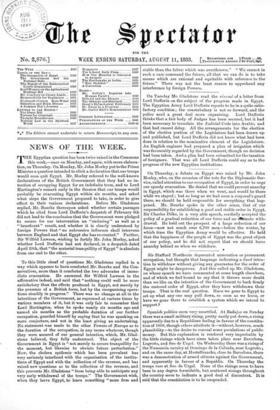To this little sheaf of questions Mr. Gladstone replied in
a way which appears to have comforted Mr. Bourke and the Con- servatives, more than it comforted the two advocates of imme- diate evacuation. He answered Sir Wilfrid Lawson in the affirmative indeed, and said that "nothing could well be more satisfactory than the effects produced in Egypt, not merely by the presence of a British force, but by the reorganising opera- tions steadily in progress." There was no change at all in the intentions of the Government, as expressed at various times by various members of it, but it was only fair to remember that Lord Hartington, when he spoke nearly six months ago and named six months as the probable duration of our further occupation, guarded himself by saying that he was speaking on mere conjecture, and not in the least giving an undertaking. No statement was made to the other Powers of Europe as to the duration of the occupation, in any terms whatever, though they were assured of our general intention, which, Mr. Glad- stone believed, they fully understood. The object of the Government in Egypt is " not merely to secure tranquillity for the moment, but likewise to obviate future perturbation." Now, the cholera epidemic which has been prevalent has very seriously interfered with the organisation of the institu- tions of Egypt and with the collection of the revenue, and has raised new questions as to the collection of the revenue, and this prevents Mr. Gladstone " from being able to anticipate any very early withdrawal of the troops." The Government wish, when they leave Egypt, to leave something "more firm and stable than the fabric which was overthrown." " We cannot in such a case command the future, all that we can do is to take means which are rational and equitable with reference to the future." There was not the least reason to apprehend any interference by foreign Powers.


































